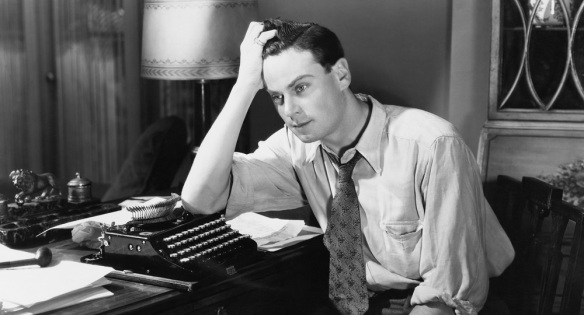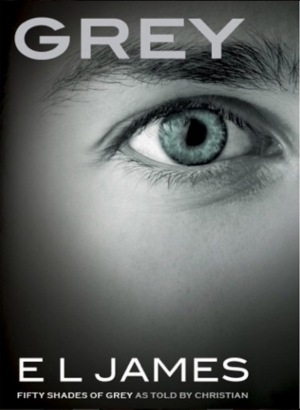 A few weeks ago I asked struggling writers to get to grips with their genre before attempting to tackle the arduous, intimidating task of writing a novel. You can read part 1 of my ‘how to fail at writing a novel’ series here.
A few weeks ago I asked struggling writers to get to grips with their genre before attempting to tackle the arduous, intimidating task of writing a novel. You can read part 1 of my ‘how to fail at writing a novel’ series here.
This month there’s a lot of ‘news’ in the literary world about E.L.James’ forthcoming bestseller, “Grey”, the companion to her “Fifty Shades” series. This time she’s telling the story from her male protagonist’s perspective.
I considered pre-ordering the book, for about a whole minute. I would love to see James flourish into a competent author, in much the same way as I saw J.K.Rowling’s writing mature and improve. Then I remembered how utterly, irrevocably shit “Fifty Shades of Grey” was, and I couldn’t bear the thought of slogging through another 500 pages of ill-written tripe. I would dearly have loved to read “Grey” so that I could express, from a first-hand perspective, how awful it is, just as I did with “Fifty Shades” (Yes, I’ve read it, and no, it’s not worth the minimal energy expenditure it takes to open the cover, let alone read to the ‘end’).
Instead I realised that it was an opportunity to talk about a key issue in literature, and something that should be everyone’s foremost concern at every stage of writing their masterpiece.
2. Don’t be original
“Fifty Shades” and its pointless sequels are a perfect example of doing a novel wrong. Of course, E.L.James is now a millionaire, despite single-handedly destroying feminism, diluting the self-publishing pool with the trash she inspires, and being yet another person who is famous for being talentless. If I sound bitter, it’s because I am. These three issues worry me greatly, particularly the first two.
I have no intention of retreading old ground by talking about the appalling pacing, terrible writing and laughable dialogue, or inept characterisation. Not to mention how painfully un-erotic the whole venture is. Nevertheless, it’s an excellent case study for the originality issues that surround this incredibly lucrative piece of radioactive cowshit.
There are two angles to this multi-pronged assault, both related to originality. The first is the matter of knock-offs in the self-publishing industry.
Working in editing and ghostwriting, I see fiction from a lot of would-be authors who would like their work appraised. Some are disappointed – occasionally offended – when I point out that they have failed to meet the number one criterion for worthwhile fiction: originality.
“It’s a bit like Fifty Shades,” they’ll tell me, “but different.”
When I challenge the author to tell me how it’s different, I get little by way of a response. The reason is that if you write an erotic book about a domineering, super-rich handsome guy seducing a naive and sexually-inexperienced girl presented in the first person, then you’ve just written “Fifty Shades”. Congratulations are due for the many who actually wrote a book far better than the one that inspired it. Condemnation is also due, however. When I ask the author why they bothered to write the story, the answer is invariably one of two: “Because I wanted to” or “Because it will sell.”
If you work for the latter reason, good for you. You’ve found an industry. Sadly it’s the arse-end of the doomed publishing industry, which produces only the most banal and saleable fiction as a result of the lasting economic downturn, lack of interest in worthwhile literature, and the advent of online stores and ebooks. This is what I call the shitmill, and if you want to be part of it, good luck to you. It’s possible to make a lot of money in exchange for your sub-literary offal.
If you work for the former reason, “because you want to”, then this is more admirable. it also promotes a mindset that is not conducive to writing a successful novel, because chances are you haven’t considered originality. You’ve just written (I’ll add that this is no less of an achievement). Who wants to read the same book over and over again? How are you innovating to stay fresh and needed in the current market? What are you bringing to the table, besides more of the same – a flavour that loses its appeal with every new sub-standard e-novel that is released?
The vast amounts of so-called erotic fiction available through self-publishing platforms, by its nature, obscures original talent by drowning it in unoriginal pap. There may well be some excellent bits of erotic fiction out there, but how can we find them amongst the derivative stuff? E.L. James has managed to create a whole sub-genre of erotica, casually called ‘billionaire romance’. It’s a sad revelation that so many women fantasize about being subjugated by a violent male whilst being ‘looked after’ and showered with lavish gifts. I may well write a separate post about how erotica is devastating to equality and gender expectations.
Unoriginality is a sign of poor imagination, which often comes with lack of talent. Even if this is only a perception, do you want to be perceived this way? Would you really happy being a rich but derided author? Before you answer, remember that your chances of becoming rich writing trash are far lower than you might even think.
The second angle of attack is something that I shouldn’t even have to point out. James is being unoriginal even within her own body of work. Why should “Grey”, which tells the “Fifty Shades” trilogy from the male protagonist’s perspective, even exist? What is it showing us that’s new? I can only assume that it will reproduce slightly summarized scenes shared by Christian and Ana, plus a few extra scenes in which Christian privately broods privately over his awful childhood and the false dilemma of whether he can have a meaningful relationship with this vapid little girl.
I’m sure fans can’t wait to speculate that there is more of Christian’s disgracefully cliché ‘dark past’ to be revealed, which raises another issue: If it takes you four novels to tell us what your main character is about, you have failed. Authors, you can take that away as a bonus lesson on how to fail at writing a novel.
Originality is the life and soul of literature. Without it, the publishing industry would have decayed long ago into a skeleton of its former self, catering only for readers of text books and biographies. If you want to be ‘a writer’, then this should be at the front of your mind every time you brainstorm. Ask yourself the following questions:
- Have I read this story before?
- Is my character behaving predictably?
- How can I differentiate this from other novels? Is that differentiation convincing?
- Did the story come to me without having to think much about it?
- Have I just reproduced this character from somewhere else, and simply renamed him/her?
A simple exercise can be to reverse everything. Let’s say you’ve just accidentally rewritten “Fifty Shades”. You should hopefully by now realise why it feels staid and boring. But what if you swapped Christian and Ana’s characters around? What if the man is the sexually-inexperienced goofball and the woman is the S&M master? Already you’re far more interesting than the rest of the derivative stuff out there. What if your Christian is actually desperately poor instead of unrealistically wealthy? How could he ever entice a young girl into his life of depravity and violence then? What if Ana were ten years older than Christian and experienced in relationships? What if Christian is the one who wants to adjust, and Ana is the one enamored with his domineering sexual preferences.
As a final note, if you really must regurgitate another author’s material, why regurgitate something that was diabolically awful in the first place?
I beg authors to strive for originality. If for nothing else, remember that publishers and agents are looking for something fresh, something that they’ve never seen before. They will undoubtedly prioritise you over someone else in your genre who was ‘inspired’ by existing fiction.
Keep reading, keep writing, never surrender!
—db


